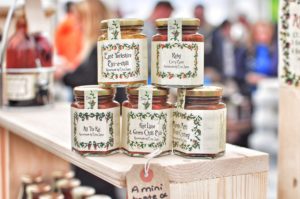Boundaries 1: Strawberry Jam
Since I began this blog I’ve wanted to write about boundaries, not only because I myself am trying to develop better ones, but also because it seems to me boundaries are a large part of what’s broken in our culture.
We’re all aware of headlines from all over the world about human rights, ethnic and racial struggle, politics, sexual identity, religion and war. It seems to me boundaries are a core piece in each headline; an enormously complex piece of human function and dysfunction. How do we define, understand and effectively manage boundaries — both our own and those of others? How do we manage people who consistently violate our boundaries?
Trying to organize my thoughts about this is like trying to herd cats. That being said, I can choose a starting point, so I’m going to start there and see if the subject organizes itself as I write.
I approach most subjects with a definition and curiosity about what others are saying about it. A Google search for “boundary” tells me it’s a “dividing line.”
I’ve read two articles recently about boundaries. One is written from an emotional intelligence perspective and one is about human rights, kind of a sidewise look at boundaries through the idea of respect. Both have contributed to my mental soup on this subject.
My experience is that any piece of human function or dysfunction begins with myself. Self-reflection and self-inquiry are powerful tools for me, even though I occasionally wince at what I find!
So, let’s play a game. Open your refrigerator, or your pantry, or your cupboard. Look at a shelf where you keep food. Everything is in a container. The container around the food is a boundary. If none of that food had boundaries around it — well, that would just be a mess.
As we start thinking about boundaries from ourselves outward, let’s take a jar of strawberry jam. It’s a glass jar with a screw top lid and it’s clearly labeled strawberry jam. Effective boundaries, it seems to me, begin with a correct identification of what’s being contained. We have to know who we are before we can create healthy boundaries, because our boundaries won’t look like someone else’s. They’re not one size fits all. You can’t keep strawberry jam in an eggshell. You don’t want raw eggs in a jar labeled strawberry jam. A can with the label torn off could still be food, but it’s hard to use it effectively.
Mislabeling happens in two directions. There are those externally who tell us who we will, should or must be (or who we will, should or must NOT be), and there are our own internal expectations of who we are and what we need. If something goes wrong right here, at the first step of boundary work, we’ve got problems.
This takes us directly back to several dynamics I’ve posted about — expectations, stories, saying yes and no, and pleasing people among them. My experience in my own western middle-class culture has been painful pressure to be who I’m expected to be, not who I really am. If this can happen to me, a straight, white, average-looking, average-sized, able-bodied, unambiguous female, then I know hundreds of thousands of people out there are being systematically emotionally and spiritually maimed in ways I can’t begin to fathom.
This opposition to knowing and being ourselves is everywhere. Capitalism is based on the idea you’re not okay as you are, but you will be if you buy…whatever it is.
I’m strawberry jam. I’m not grape jelly, even though it’s more valuable. I’m not blackberry jam, even though it’s more attractive. I’m not raspberry jam, even though it’s more popular. Go ahead, glue a label on me that says “currant jelly.” I’m still going to be strawberry jam, and my true boundaries are a glass jar with a screw top lid and a label that says strawberry jam.
As cruel as it is, the external pressure we feel to be other than we are is not the most damaging thing. The most damaging piece is what we do internally to ourselves. I can spend my whole life with my fingers in my ears and my eyes squinched shut saying I’m peanut butter, but I’ll always be strawberry jam. Other people will know it. I’ll know it. Nothing will ever work for me because I’m in the world trying to be something I’m not. I won’t find my people. I won’t find my place. I won’t figure out and make my contribution. I won’t have effective boundaries. I won’t be happy.
Not only that, but my inability to manage and maintain effective boundaries affects everyone around me. If my jar is cracked or broken, strawberry jam is going to ooze out onto the shelf. It’ll make a mess. It’ll attract pests and predators. It’ll be wasted and it will impoverish the peanut butter, the toast, the butter and whatever else might have connected with me as strawberry jam.
In order to have healthy boundaries we have to know what we need. In order to know what we need we have to know who we are. Finding out who we are can be a terrifying prospect, especially if we’re captive to what other people, media, our culture, and most of all ourselves tell us we MUST be in order to get loved and find happiness, meaning and purpose.
I have made up my mind I will build better boundaries. I will figure this out. If anybody out there will walk beside me, I’ll be very pleased. I know I’m not the only one struggling with this. In fact, I don’t know anyone who doesn’t have trouble with some piece of it.
My starting point is right here, with myself. I’m strawberry jam and my boundaries are a glass jar and a screw top lid. My label says strawberry jam. I’ve no interest in forcing, persuading or coercing anyone else to be strawberry jam. I just know what I am. It might be that strawberry jam is outlawed, shunned, shamed, beheaded, tortured, raped, imprisoned, damned to Hell, unsaved, unenlightened, unlovable, unwanted, unworthy or lined up against a stone wall and shot under a hot sun. I’ll still be strawberry jam. I’m not confused and I’m not going to feel ashamed about it.
Peanut butter and strawberry jam sandwich, anyone?
All content on this site ©2016
Jennifer Rose
except where otherwise noted





